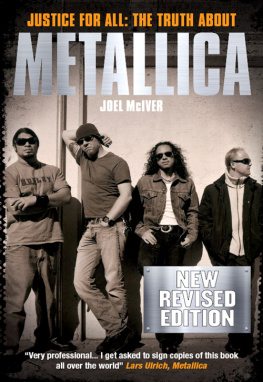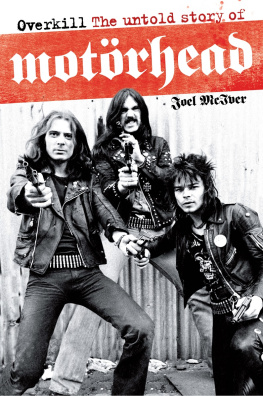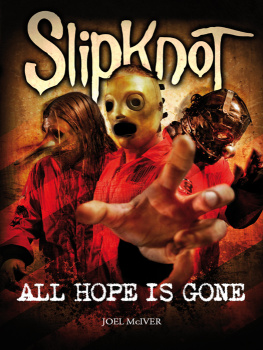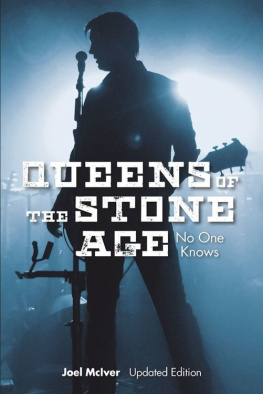Copyright 2014 Omnibus Press
This edition 2014 Omnibus Press
(A Division of Music Sales Limited, 14-15 Berners Street, London W1T 3LJ)
EISBN: 978-1-78323-123-2
Cover designed by Fresh Lemon
Cover photo by William Hames
Back cover photo by Jeff Kravitz / FilmMagic / Getty Images
The Author hereby asserts his / her right to be identified as the author of this work in accordance with Sections 77 to 78 of the Copyright, Designs and Patents Act 1988.
All rights reserved. No part of this book may be reproduced in any form or by any electronic or mechanical means, including information storage and retrieval systems, without permission in writing from the publisher, except by a reviewer who may quote brief passages.
Every effort has been made to trace the copyright holders of the photographs in this book, but one or two were unreachable. We would be grateful if the photographers concerned would contact us.
A catalogue record of this book is available from the British Library.
For all your musical needs including instruments, sheet music and accessories, visit www.musicroom.com
For on-demand sheet music straight to your home printer, visit www.sheetmusicdirect.com

This book is dedicated to Alice McIver, born on August 30, 2003.
Preface To The 2014 Edition
Its been 10 years since Justice For All: The Truth About Metallica was first published in 2004, and now that this book is in its fourth edition (after previous updates in 2005 and 2009), a bigger picture is starting to emerge of Metallicas career. In particular, the decades worth of creativity which Ive chronicled in real time has come under close scrutiny.
Youll notice that the most recent creative efforts of James Hetfield, Kirk Hammett, Rob Trujillo and Lars Ulrich are marked by a sense of exploration outside most rock bands usual parameters. Since 2004 Metallica have only released one album of original, non-collaborative material, 2008s mostly average Death Magnetic, but have devoted their time away from the studio in all sorts of unorthodox ways. Gathering the other members of the Big Four Of Thrash for a celebratory tour in 2010 was a high point. Recording the Lulu album with Lou Reed was probably the lowest point in most peoples eyes, although I have a slightly different view of that much disparaged record that you may or may not find refreshing. Along the way Metallica have set up a record company, and a festival, and funded a film with $18 million of their own money, although only the first of these enterprises looks set to be a financial success at the time of writing.
Although they continue to endure the verbal assaults of thousands of detractors, most of whom are safely protected by a computer monitor and a juvenile screen name, Metallica have truly dared to fail, in the words of one of Hetfields many post-therapy, post-rehab, post-everything tattoos. This is what makes them so interesting, which in turn necessitates the revision of books like this one. Thanks to Metallica for continuing to be the greatest heavy metal band of our generation, flaws and all, and thanks to you for reading my account of their always-spectacular trajectory.
Joel McIver
www.joelmciver.co.uk
Foreword
By Thomas Gabriel Fischer, Celtic Frost/Apollyon Sun
Is it possible to truly capture, by means of mere typed words on dry paper, a feeling as intense and pungent as almost no other, a spirit, a rebellion, an uncontrollable and fanatical adolescent urge? A music? Is it possible to accurately portray the attitude and mood of a time and a generation, if that very generation is propelled by something which cannot be expressed by words? By music?
I am tempted to say, no, it cant Yet at the same time I believe it is extremely important that somebody attempts to do just that.
Metallica changed the face of modern rock music at least twice. The first time in the early Eighties, when they burst onto a brand-new scene of hungry kids looking to exorcise the lingering motionlessness and complacency of late-Seventies hard rock by applying the raw power the punk movement had so brazenly demonstrated. Metallica took this power, already roughly developed by the groups of the New Wave Of British Heavy Metal, and presented it to us in a completely new and utterly infectious form. And the second time came some ten years later, when they proved to that same scene, which itself had become a solid and unreservedly self-indulgent, industry-driven monster, how to still produce a ground-breaking masterpiece by releasing what is popularly referred to as the Black Album.
To some, all this might not seem to be important. Fair enough. But for me, and for hundreds of thousands of others it changed our lives. It became our world, and it remained part of the foundation of how we perceive music for the rest of our lives.
The very first time I heard Metallica, they still barely resembled what later became perhaps the most significant force in hard music. I was a teenager in what was purely an underground scene in 1981, 82, long before the introduction of things like home PCs, the internet or CDs. My friends and I tried to scrape together enough money to buy obscure new 7 metal singles from correspondingly obscure insider record stores, and we would spend our Saturdays driving around for hours to find new releases, imported only by a few obsessive store owners in editions of perhaps one or two. I was also part of what had become a flourishing cassette trader network, where kids would copy and exchange new metal tracks by duplicating tapes and sending them to their contacts all over the world. Along with such cassette copies, we also received photocopied fanzines which listed an endless array of names of up-and-coming metal bands. Among these names was Metallica.
Two of my best friends at the time were older than me and already held real jobs and made real money. It was for that reason that they were able to get their hands on some of the hottest new music before the rest of us. They would put together cassette compilations for me, and, some time in 1982, one of these tapes contained a track that was faster and more intense than anything I had ever heard before. It was incredibly modern and included a seemingly never-ending lead guitar section which completely blew our minds. The track was Hit The Lights, and the band was Metallica. My friends had taped it for me from one of the first copies of the pioneering Metal Massacre compilation album.
There was an air of unpredictability in the eras musical development, and Hit The Lights was a typical exponent. It was implausibly fresh, daring, extreme, and much more advanced than most of the music from the then still dominating British bands. A later edition of the same first Metal Massacre compilation album, which I rushed out to buy, contained a re-recorded version of Hit The Lights, and it already became apparent that Metallica were a band that wasnt content with staying stationary.
I was in England, and only months away from the release of the first recording of my own band, when I found Metallicas first album in a record store in late summer 1983. It is almost embarrassing, but Kill Em All remains in many ways my favourite Metallica release to this very day, as simple and spartan as it is and as much as Metallica have proven to be capable of musical invention since then. But Kill Em All








